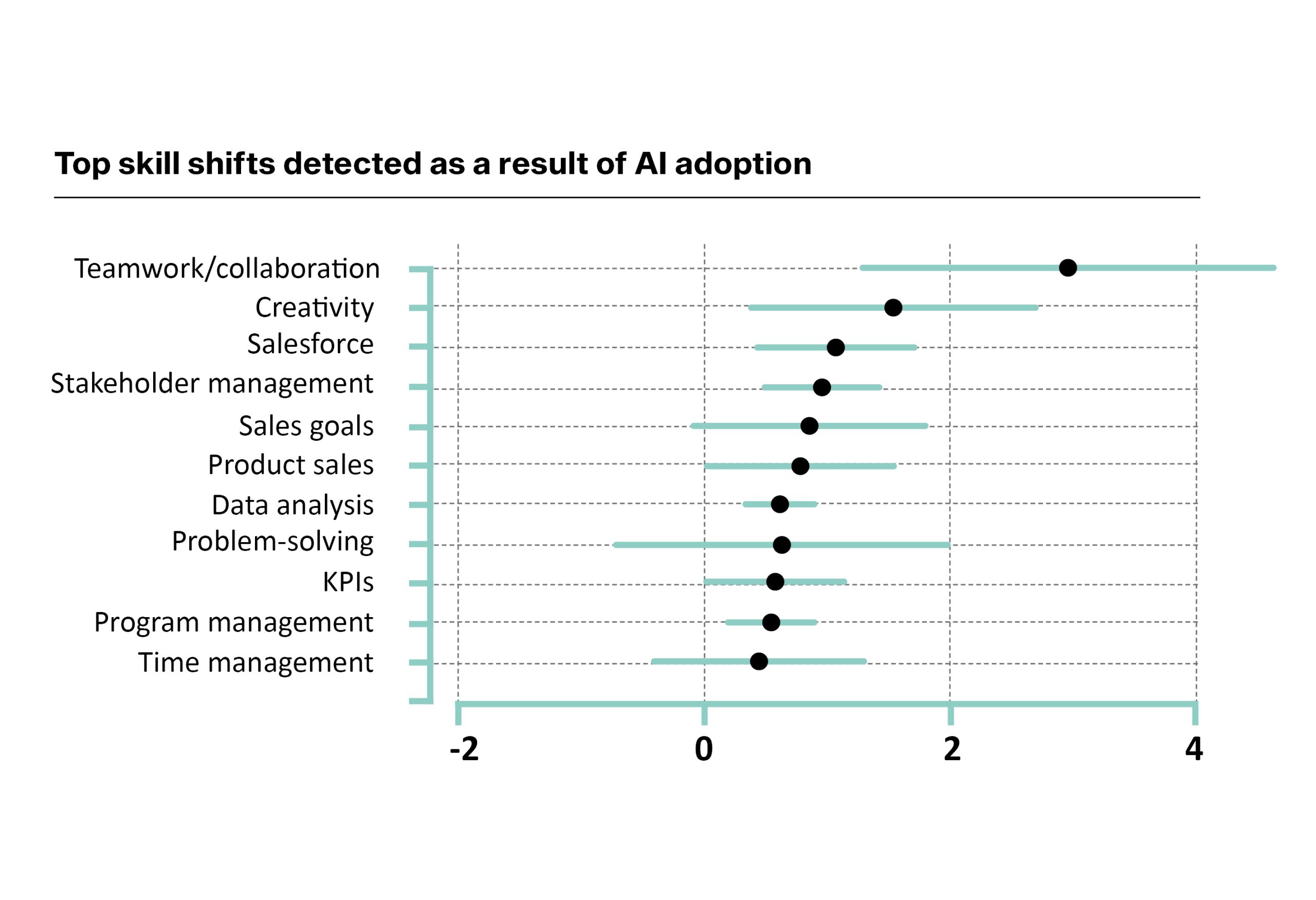
IESE Insight
AI is increasing demand for managers — and changing their skill sets
A study of job postings suggests, rather than reducing the need for managers, AI-driven transformations intensify managerial demands, making human judgment a crucial complement to AI capabilities.
By Mireia Giné
Imagine slashing millions in marketing costs while ramping up campaign volume and creative impact, all thanks to artificial intelligence (AI). The Swedish fintech company Klarna did just that, achieving a balance between quantity and quality that was previously thought impossible.
The old trade-off between scale and personalization is vanishing as AI allows companies to generate high-quality, customized content at unprecedented speeds. But this transformation doesn’t happen automatically — it requires managers who understand AI’s potential and can devise strategies to harness it effectively. Rather than replacing managers, AI calls for a new kind of leadership, where human judgment and strategic vision are crucial to success.
That’s at the heart of my joint research with Liudmila Alekseeva from KU Leuven, together with IESE colleagues José Azar and Sampsa Samila, which suggests that AI is prompting firms to hire more managers. After analyzing 375 million U.S. job postings between 2010 and 2022, we found an increase in demand for managerial roles among companies that had adopted AI systems. Managers, it seems, play a crucial role in guiding AI’s integration into workflows and crafting strategies that leverage AI’s potential while safeguarding against its limitations.
Greater demand for managers
For years, people have speculated that AI would reduce the need for managers by automating repetitive tasks. Yet our research found the opposite: For every one percentage point increase of AI adoption measured, there was an increase of 2.5% to 7.5% of total management vacancies and an increase of 0.4% to 1.4% in the share of managers.
The reason is simple: AI, while quick and powerful, still needs human judgment. It’s a tool that enables workers to do tasks faster and sometimes better, so taking advantage of it requires adequate judgment to understand the most important things to do.
Managers play a vital role in supervising the integration of AI into workflows and managing both AI and human teams. In some retail firms, for example, AI can predict customer preferences and optimize inventory levels. In those situations, it’s the human managers’ duty to ensure these AI-driven insights are used effectively — whether it’s by implementing their insights, making on-the-ground adjustments or training employees to work with AI.
Changing skill sets
AI’s ability to analyze vast amounts of data, predict trends and give insights brings a new level of sophistication — and potential risk — to organizational processes. This shift creates a unique challenge: While AI can speed up routine tasks and even some high-level functions, it still requires human judgment to ensure its use aligns with organizational goals, ethical standards and nuanced decision-making. As a result, the role of a manager is beginning to shift more toward cognitive and interpersonal skills.
That’s because AI systems are not “set and forget.” They require constant tuning, monitoring and ethical judgment, adding new complexity to the workplace. Managers are now in a situation where they need to navigate this new landscape and are expected to excel in certain key areas.

Data analysis. When it comes to data analysis, AI generates vast amounts of information, but managers need to interpret this data to make strategic decisions.
Creativity. Managers face unprecedented challenges in coordinating human and AI workforces, requiring creativity like never before. For example, a manager might need to brainstorm innovative ways for employees to leverage AI tools effectively, transforming raw insights into actionable steps that benefit the company.
Stakeholder management. We analyzed how Novartis, the pharmaceutical company, used AI in a way that not only gained efficiencies in their current processes but also changed those very processes themselves. So, with AI, Novartis was able to share data across the entire organization via an app, giving multiple stakeholders — from the CEO to the sales team, across 50 brands in 50 countries — the same real-time, granular-level data to assist in their budgeting and forecasting decisions. That, in itself, is revolutionary because it eliminates a lot of time-consuming negotiations and interdepartmental politics. But beyond these efficiency gains, the AI opened a new space of actionable questions that were previously very difficult to answer.
Studying Novartis, we saw they were able to generate multiple new scenarios. As the process gets more complex, with ever more scenarios, the traditional job of forecasting moves beyond just sales to encompass new production investments and cash flows, among many other considerations. This, in turn, requires building and maintaining strong relationships with a multitude of teams and partners, both internal and external. This reconfiguration of processes expands the responsibilities and capabilities required of certain roles, demanding different attributes such as multistakeholder management tied to revenue growth, as exemplified by the Novartis experience.
Problem-solving. Besides managers ensuring that AI systems align with regulatory standards, AI also introduces ethical dilemmas that managers will need to address. These include ensuring that AI complements, rather than replaces, human workers, as well as ethical concerns around data privacy and challenges related to data biases.
Our IESE colleague Eduard Talamas cites the cautionary tale of a company that had introduced AI into its hiring process. The company fed past data about who it was hiring into the AI, and the algorithm was supposed to predict who it should hire next. Eventually the company discovered the algorithm was discriminating against female candidates. When something like this occurs, the temptation might be to ditch the algorithm. But, as Talamas insists, there’s a better alternative: the same AI that can make bad hiring decisions at scale can also be used to make good hiring decisions at scale, if you have skilled managers willing and able to figure out exactly what’s going on and then fix it. When designing an algorithm, you have to give it a clear objective. The issue with this company was that no one had taught the algorithm how to hire according to firm-specific principles and parameters, which must be set by human managers. Mistakes, like this, speak to the larger point of the indispensable role of human judgment in overcoming such biases.
READ ALSO: How to understand AI’s potential impact on knowledge jobs by Eduard Talamas and Enrique Ide, with a framework for understanding the impact of AI on the knowledge economy.
Expertise beyond domain-specific knowledge. All of the above implies we will have to broaden our expertise in order to reap AI’s transformational impact. As in the case of Novartis, people were no longer looking just at sales, but they had to become experts in the whole, broader process. They were, in fact, moving the finance function to act much more like a business consultant, providing insight to the rest of the organization.
This shift in demand for managers with these skills is reflected in compensation. Companies adopting AI tend to offer higher salaries for these managerial roles, indicating the growing value placed on them.
What does this mean for business leaders?
The effects of AI implementation on managerial demand depend on the nature of your organization and industry.
For decades, digital technologies such as personal computers, the internet, cloud services and large applications like enterprise resource planning (ERP) systems enabled companies to streamline communication and automate routine tasks. These tools empowered employees with real-time information, allowing for quicker decision-making and reducing reliance on managers’ judgment. This decentralization allowed companies to cut costs and increase agility, reducing the need for layers of management to ensure operational efficiency. However, the result of so many organizations becoming flatter is that there may be fewer managers overseeing larger teams. This has implications for AI oversight in such a context.
There are also different implications for different industries. For example, the largest increase in managerial demand as a result of AI adoption was experienced in the manufacturing sector. Because AI tools improve production processes and supply-chain management, managers are needed to oversee complex, technology-driven systems that require nuanced human judgment. The finance sector, on the other hand, showed less-clear trends in management demand, possibly because finance firms already employ a high degree of automation and data-driven decision-making.
Regardless, it’s important to prepare for a future where managers are key players in ensuring AI integration benefits the company as a whole.
In order to do this, companies should invest in manager training for soft skills such as communication, emotional intelligence (EQ) and creativity. AI should be seen as a tool that enhances, rather than replaces, human judgment. Managers are essential in ensuring AI tools are used ethically and effectively.
Fostering a hybrid human-AI workforce will be key. AI’s increasingly important role in companies will create a new dynamic between human and AI “workers,” requiring flexible management strategies. Companies will have to coordinate between human teams and AI systems, interpreting AI outputs and ensuring they align with organizational goals.
A new symbiosis
- Integrating workflows between humans and AI protocols.
- Developing strategies to supervise both human and AI-driven work.
- Interpreting the results from AI, and seeing if the outcomes are truly aligned with the goals.
MORE INFO: “AI adoption and the demand for managerial expertise” by Liudmila Alekseeva, José Azar, Mireia Giné and Sampsa Samila.
Mireia Giné spoke on the subject of “AI adoption and the demand for managerial expertise” at IESE’s 2024 Global Alumni Reunion (GAR) in Madrid. Her talk — along with “Is AI coming for our jobs?” by Eduard Talamas, as well as the rest of the GAR sessions on the theme of The courage to create the future — is available to Alumni Members to watch on demand via the IESE Alumni website.
This article is published in IESE Business School Insight magazine #169 (Jan.-April 2025).
READ ALSO:
How to understand AI’s potential impact on knowledge jobs
Artificial intelligence in Europe: balancing innovation with regulation
Common ownership: implications for competition and markets





